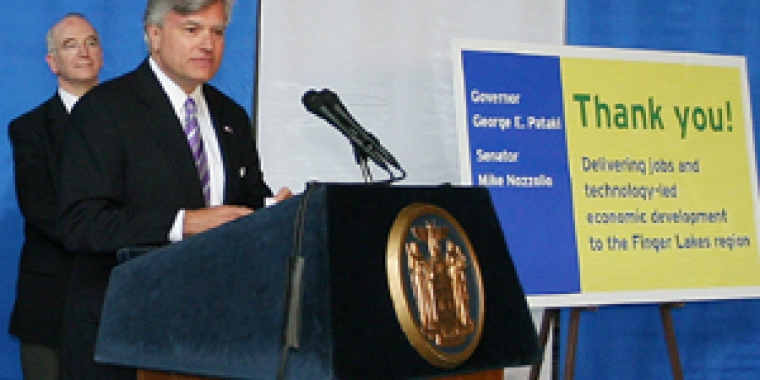
Nozzolio Announces New York State Food Laboratory Moving To Geneva

Geneva-New York State Senator Michael F. Nozzolio (R-Fayette)today announced $40 million in State funding to construct a new, state-of-the-art food laboratory at the Cornell Agriculture & Food Technology Park in Geneva, Ontario County.
The lab will be another component in a cluster of high-tech facilities at the park dedicated to agriculture, food, and biological-based enterprises. A new $25 million, 60,000-square foot U.S. Department of Agriculture (USDA) Center for Grape Genetics Research will commence construction in the park soon, and a $5.9 million, 20,000-square foot, multi-tenant Flex Technology incubator building has already been constructed. The new State food lab, which is scheduled to be completed in 2009, will complement these other projects, which have received a mix of State, federal and private funding.
“This landmark announcement of the New York State Food Laboratory coming to the Cornell Agriculture and Food Technology Park will ensure that New York is at the forefront of food and agricultural technological breakthroughs," said Senator Nozzolio. "New York will be a leader in testing the food we eat for impurities and specific health hazards, such as E. coli, which recently spread throughout the country. The new food lab will provide jobs for our region and I sincerely thank Governor Pataki for his partnership in the creation of the Ag-Tech Park and his continued support to help make Geneva and the Finger Lakes region an international leader in agricultural research.”
The New York State Food Laboratory will provide expert analytical testing for all food safety and security programs in New York State. As a division of the State Department of Agriculture and Markets, the lab has expertise in food chemistry, food microbiology, and pesticide residue. In addition, the lab will support the regulatory programs of the Department of Agriculture and Markets in the areas of food safety, milk control, and horticulture.
The Food Lab provides analytical testing of samples that are collected as part of scheduled surveillance programs, as well as samples taken as part of investigations of disease outbreaks and consumer complaints. The lab also provides specialized analytical services to various state and federal agencies.
Among the programs administered at the lab are: food analysis; microbiology; food and dairy chemistry; animal feed and pet food analysis; fertilizer and lime analysis; wine and liquor analysis; food safety and security programs; and the Food Emergency Response Network (FERN), which is part of a national infrastructure that responds to food emergencies.
The Food Lab also has cooperative agreements with the U.S. Department of Agriculture (USDA) for a microbiological data program to detect pathogens in fresh food and a pesticide data program to test fruit, vegetables, and public drinking water for pesticide residues. Under the pesticide data program, the lab has become an international leader in the development and application of new technologies to protect public health.
By locating the Food Lab at the Cornell Agriculture & Food Technology Park, the State will be in a position to work closely with the adjacent Cornell University Institute of Food Science, one of the preeminent food science research programs in the world. The Food Lab will also be well positioned to recruit and attract Cornell food science students for employment.
During 2005, 20,395 samples of food, beverage, animal feed, fertilizer and lime samples were tested as part of regulatory surveillance programs, foodborne disease outbreak investigations, consumer complaints, and investigations of suspected food tampering cases. Samples were tested for human health hazards such as bacterial contamination, antibiotic residues, presence of poisons and toxins, undeclared allergens, color additives, spoilage, and shelf stability.
The Food Lab will replace an outdated facility at the Harriman State Office Campus in Albany. The lab is staffed by 42 State employees, including approximately 30 chemists, bacteriologists and microbiologists. The remaining staff consists of laboratory technicians who receive significant specialized training as part of their employment.

